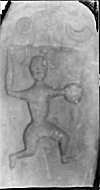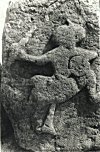Sculptured Stone Memorials
by K. L. Kamat
Page Last Updated: December 07, 2024
Well-dressed and sculptured pillars are found in some remote villages. Six such pillars have been shifted to Pachmadi (in the District of Hosangabad) and erected in an open ground in front of the Tahasildar's office. Another five of them have been exhibited in the premises of the Tribal Research Institute, Chhindwara, which were brought from a village near Tamiya (Dist.: Chhindwara). Each pillar consists of one or two panels on each face. These are essentially hero-stones are they are meant to glorify the warriors. Thus in all these tombs, last one of the panels shows the hero in combat with the enemy. Though it is quite evident that the hero got killed in the fight, it is customary to represent him as stronger than his rival.
At Pachmadi, in one of the panels, the hero with a sword and shield has engaged the enemy with a bow and arrow. In another the hero riding a horse is holding a sword and is in the act of attacking the enemy on a pony armed with a bow and arrow. In some panels, only the hero is shown in an attacking stance. In another set of panels, the hero is with his wife, who attends to his wounds. The couple is also shown together with folded hands which indicates that the wife might have committed Sati ultimately. In the third set, the hero is worshipping the Shiva-linga either standing or sitting on a raised platform. Often, the Hindu deity Ganesh is also included in one of these panels.
Chindwara memorials are very similar to those of Pachmadi with minor variations. in one of the panels, the wounded hero is lying on a cot and the medicine man is trying his best to save the hero's life by praying with out-stretched hands. The panel in which the hero with a sword and shield is in combat with his enemy in identical with that of Pachmadi. Verrier Elvin suggests that these my belong to ninth or tenth century A.D.

The Hero with his Wife
Pillar Memorial, Chandagaon
Size: 2 feet X 2 1/2 feet
A solitary red sandstone pillar on the outskirts of Chandangaon (in the District of Chindwara) is having one panel each restricted to only three faces. The usual war scene is lacking; the man on the cot is being attended to by his wife (shown above) which suggests that he might have died of illness. Details like pillow, stool, and ornaments are well-illustrated. In the second panel, a cow is busy suckling its calf. In the last panel the men is worshipping a Linga. The local people are not very sure about the significance of this memorial but presume that it wards off evil spirits from the village. The memorial seems to belong 12th or 13th century and it is significant that the local tribals use the same area as their burial ground.
Sculptured stone-slab memorials are still in vogue in Bastar. They are mostly concentrated in Nar4ayanpur and Dantewara tehasils of the district. In Barsur village alone, there are four groups of such memorials mixed up with temple icons. An attempt by the Archaeological Department to shift them to a newly constructed museum was foiled by the locals on the plea that they constitute their tribal gods. Mostly they are single-paneled, hero-stone type and depict the heroes in action. On the basis of style and execution these could be classified into two distinct groups.
 |
 |
|
| Depiction of Heroes in Barsur Memorials | ||
To the first group belongs the tribal slabs which are crude, uneven, and executed in shadow type. One such memorial almost look like an abstract drawing. The man is in attacking position, but it is extremely difficult to distinguish his right hand from the sword and left palm from the shield! In another the hero is advancing towards the enemy with a drawn sword. From his waist belt there hangs an object which could be construed as a "tumba" (hollowed gourd) used for carrying water and liquor. Malicious intentions of a hero to kill his enemy is well brought out in a memorial. Another hero is charging the enemy with all the ferocity he could command. The fact that there used to be left-handed heroes is indicated in a memorial where a shield is shown in right hand and a sword in the left.
In the second group, the hero-stones are well-planned, carefully chiseled, well polished in order to give three dimensional effects. These could be compared with highly evolved hero-stones of the country. The only difference is that the inscriptive part is totally lacking. The artist has taken care to include all the details such as ornaments, head gear and an umbrella. It is not uncommon to show the hero riding a horse with his dagger drawn out. In another memorial the hero has a poniard hanging from his waist and he holds a Shiva-linga in his right hand.
Painted Memorials
Painted Slab Memorial
Size: 6 feet X 3 feet, Gidam in Dantawada
A few specimens of painted granite slabs were observed in Dantawara Tehsil of Bastar district. These rectangular memorials are white washed and divided into four or five panels. Green and deep blue colors are employed for drawing trees and shrubs. Rarely human figures are also included. Some of the white washed tombs are also decorated with colored illustrations.
Memorials of Madhya Pradesh
Origins | Distribution | Installation
Non-illustrated Memorials | Illustrated
| Wooden
Sculpted & Painted Memorials | Religious
References


